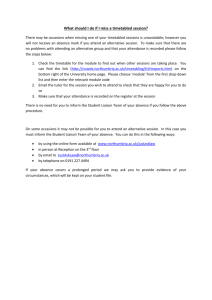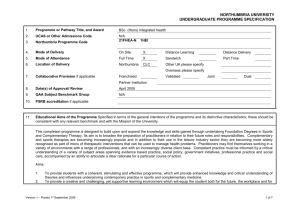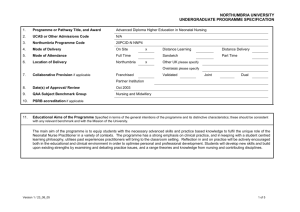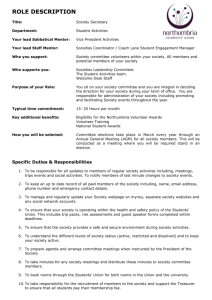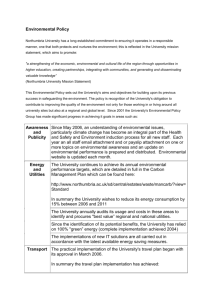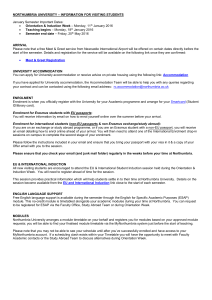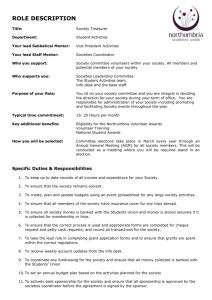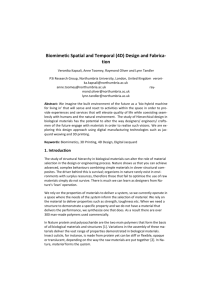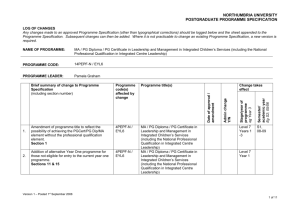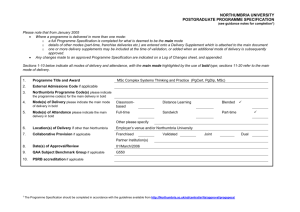Postgraduate Diploma of Public Health
advertisement
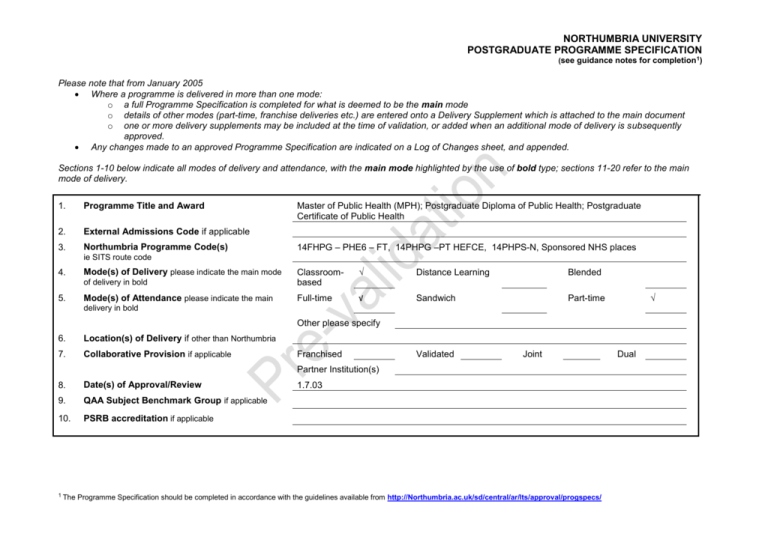
NORTHUMBRIA UNIVERSITY POSTGRADUATE PROGRAMME SPECIFICATION (see guidance notes for completion1) Please note that from January 2005 Where a programme is delivered in more than one mode: o a full Programme Specification is completed for what is deemed to be the main mode o details of other modes (part-time, franchise deliveries etc.) are entered onto a Delivery Supplement which is attached to the main document o one or more delivery supplements may be included at the time of validation, or added when an additional mode of delivery is subsequently approved. Any changes made to an approved Programme Specification are indicated on a Log of Changes sheet, and appended. Sections 1-10 below indicate all modes of delivery and attendance, with the main mode highlighted by the use of bold type; sections 11-20 refer to the main mode of delivery. 1. Programme Title and Award 2. External Admissions Code if applicable 3. Northumbria Programme Code(s) Master of Public Health (MPH); Postgraduate Diploma of Public Health; Postgraduate Certificate of Public Health 14FHPG – PHE6 – FT, 14PHPG –PT HEFCE, 14PHPS-N, Sponsored NHS places ie SITS route code 4. 5. Classroombased √ of delivery in bold Mode(s) of Attendance please indicate the main Full-time √ Mode(s) of Delivery please indicate the main mode Distance Learning Blended Sandwich Part-time √ delivery in bold Other please specify 6. Location(s) of Delivery if other than Northumbria 7. Collaborative Provision if applicable Franchised Validated Joint Partner Institution(s) 8. Date(s) of Approval/Review 9. QAA Subject Benchmark Group if applicable 10. PSRB accreditation if applicable 1 The 1.7.03 Programme Specification should be completed in accordance with the guidelines available from http://Northumbria.ac.uk/sd/central/ar/lts/approval/progspecs/ Dual NORTHUMBRIA UNIVERSITY POSTGRADUATE PROGRAMME SPECIFICATION Sections 11 – 20 relate to the main delivery as indicated in bold above. 11. Educational Aims of the Programme Specified in terms of the general intentions of the programme and its distinctive characteristics; these should be consistent with any relevant benchmark and with the Mission of the University. 12. Give students from a variety of public health backgrounds and countries, the opportunity to study at Masters Level as defined by the NQF and facilitate their academic development, progress and achievement. Deliver high quality teaching that not only demonstrates a synergy between research and teaching, but also represents the most recent evidence based practices within public health. Offer a diverse portfolio of provision that allows students to develop their enquiry and research skills as well as public health knowledge and skills within validated and where necessary professionally approved pathways. Enable students to understand the principles of, and contribute to, public health policy, management and practice in different contexts. How Students are Supported in their Learning/Employability/Career Development eg curriculum design, personal development plans, placements, fieldwork, practical projects. The modal student accessing this programme is likely to be an individual, working in an area of public health (for example, health promotion, community development, primary health team, regeneration and health action or environmental health) who undertakes study on a part time or full-time basis. The programme aims to facilitate their career development in public health through the enhancement of their abilities in: dealing with complex issues, making sound judgements in the absence of complete data, and communicating their conclusions clearly to specialist and non-specialist audiences; demonstrating self-direction and originality in tackling and solving problems, and acting autonomously in planning and implementing tasks; continuing to advance their knowledge and understanding; transferable skills in exercising initiative and personal responsibility and decision-making in complex and unpredictable situations. independent learning required for continuing professional development. MPH students will be offered guidance and project supervision during their study experience to support personal, academic and professional learning. Opportunities will be available for all students to discuss study issues and assessment feedback. Students will undertake a learning contract at the start of the programme to enable them to collaboratively tailor their learning opportunities to their specific need, within the scope of the programme learning outcomes. All students will be offered an opportunity to engage in formative study skills development, where this need is identified. The core and most of the defined area competencies from the Public Health Skills and Career Framework (2008) are embedded in the curriculum. Students’ career development will be enhanced through the acquisition Document1 2 NORTHUMBRIA UNIVERSITY POSTGRADUATE PROGRAMME SPECIFICATION of these competencies. 13. Learning Outcomes of Programme Specified in terms of performance capabilities to be shown on completion of the programme. Please identify numerically to correspond to the map of learning outcomes in section 18. a) Knowledge and Understanding On completion of the programme students will have critical understanding of: 1. A range of core concepts, theories and frameworks which are fundamental to public health policy and practice, including assessment and surveillance, health improvement and health protection 2. The social, ethical and political context of public health practice in a range of global contexts 3. Research principles, design and methods and their use in analysing and creating evidence to advance public health knowledge 4. Methods of collecting, analysing, handling and applying epidemiological data and other sources of public health intelligence, to influence public health strategy, policy, and service/ quality improvement 5. A range of learning methodologies, for example enquiry based learning, reflection, portfolio development and learning contracts, and their importance in professional development 6. Theories of collaborative working, personal leadership and team leadership needed to effect ongoing change and improvement in public health service delivery and public health practice. b) Intellectual Skills 1. Critically debate social and political contexts for protecting health and preventing ill health in a range of international contexts. 2. Critically consider the complexities of analysing and translating epidemiological research findings (social and medical) into: public health policy; sustainable health development strategies; and public health service improvement. 3. Critically analyse ethical, quality and governance issues associated with retrieving and handling research and public health data 4. Critically evaluate research principles, design, methods and their potential contribution to advancing public health knowledge 5. Critically appraise a range of public health concepts, theories, frameworks that underpin public health practice 6. Critically reflect on their personal and professional development at Master’s level in a public health context 7. Critically appraise the complexities of effective collaborative working in a range of public health contexts 8. Critically analyse the concept of leadership and its contribution to collaborative public health improvement c) Practical Skills On completion of the programme students will be able to: Document1 3 NORTHUMBRIA UNIVERSITY POSTGRADUATE PROGRAMME SPECIFICATION 1. 2. 3. 4. 5. Construct an electronic portfolio through which to document their professional and learning development Demonstrate competence in the location, retrieval and management of literature from a variety of sources. Use electronic platforms to support their learning; Present their work to others Access and use population health statistics and other evidence from a range of national and international sources, including Internet sites; 6. Demonstrate competence in partnership working; d) Transferable/Key Skills On completion of the programme students will have consolidated the following: 1. Communication skills; 2. Team working skills; 3. Time management skills; 4. Project management skills; 5. Skills of critical reflection. 14. Learning, Teaching and Assessment Strategy Specified to enable learners to achieve and demonstrate the above learning outcomes. The teaching, learning strategies used will be creative and varied. Students will experience lectures, seminars, group work, case studies, problem-solving exercises, skills development (including statistical software), project related work (facilitated by guidance supervision), directed and independent learning. Given the rich diversity of experience within the student group, interprofessional learning will be used where relevant, to enable students to learn with, from and about each other to promote collaboration in national and global public health practice. Where appropriate visiting specialist lecturers will contribute. The eLearning portal will play a significant role in the students’ experience providing learning resources and material from class-based sessions. Students will also be encouraged to communicate with each other and staff via the eLearning portal. Students will engage with available electronic portfolio software, e.g. Pebblepad, to develop a portfolio to evidence their learning development throughout the programme. The assessment strategy is designed to reflect the range of module learning outcomes and includes the full range of approaches. The strategy is also designed to enable the students to demonstrate their ability to apply their knowledge and understanding of the core public health competencies outlined in the Public Health Career and Skills Framework (2008). It will be sufficiently flexible enough to enable students, whatever their public health background, to draw on their experiences. The assessment strategy will also be built around the principles of Assessment for Learning at module level and programme level. For example, within modules several formatively assessed activities will provide an opportunity for feedback to students on their progress and this will inform their summative assessment. At a Document1 4 NORTHUMBRIA UNIVERSITY POSTGRADUATE PROGRAMME SPECIFICATION programme level the portfolio will be summatively assessed in one module but will offer the opportunity for ongoing formative assessment and feedback through guidance tutorials. 15. Programme Structure The Modular Framework for Northumbria Awards2 allows programmes to be validated with up to 30 Level 6 credits. Possible stages/awards are indicated; please delete rows as required. Diagrams can also be used to demonstrate the structure. Programme Structure: See Appended Diagrams Postgraduate Certificate 60 credits at Level 7 Postgraduate Diploma 120 credits at Level 7 Level 7 180 credits at Level 7 2 PL0734: Public Health Fundamentals: Concepts, Theories and Frameworks AA0126: Research Skills: Approaches, Designs and Methods PL0735 Leadership and Collaborative working in Public Health PL0736 Public Health Intelligence and Epidemiology: Informing policy and strategy PGS Dissertation options for example: PP0191 Systematic Appraisal of Published Research PP0189 Empirical Project PP0190 Practice Project The Modular Framework for Northumbria Awards available from http://Northumbria.ac.uk/sd/central/ar/lts/approval/framework/ Document1 5 NORTHUMBRIA UNIVERSITY POSTGRADUATE PROGRAMME SPECIFICATION 16. Lower Level Awards Credit Structure and Programme Learning Outcomes for Lower Level Awards. Please delete or add rows as appropriate, with reference to the Assessment Regulations for Northumbria Awards 3 . Learning outcomes should be specified for each lower level award in accordance with the QAA Framework for Higher Education Qualifications 4 which also provides generic qualification descriptors for each level. The standard credit structure for each award is given below. The Modular Framework for Northumbria Awards2 allows postgraduate taught programmes to be validated with up to 30 Level 6 credits. Award Programme Learning Outcomes may be completed with reference to section 13. Postgraduate Certificate 13 (a) Knowledge and Understanding 1,2,3 & 5 13 (b) Intellectual Skills 1, 2,3,4,5 13 (c) Practical Skills 1, 2, 3, 4, & 6 60 credits at Level 7 13 (d) Transferable skills 1,2,3,5 Postgraduate Diploma 13 (a) Knowledge and Understanding 1 - 6 13 (b) Intellectual Skills 1 - 8 13 (c) Practical Skills 1 - 6 120 credits at Level 7 13 (d) Transferable skills 1,2,3, 5 2 The Modular Framework for Northumbria Awards available from http://Northumbria.ac.uk/sd/central/ar/lts/approval/framework/ The Assessment Regulations for Northumbria Awards available from http://Northumbria.ac.uk/sd/central/ar/lts/approval/assess/ 4 There is a link to the QAA Framework for Higher Education Qualifications at http://Northumbria.ac.uk/sd/central/ar/lts/approval/ 3 Document1 6 NORTHUMBRIA UNIVERSITY POSTGRADUATE PROGRAMME SPECIFICATION Professional Graduate Certificate in Education (PGCE) 13 (a) Knowledge and Understanding 1 - 6 13 (b) Intellectual Skills 1 - 8 120 credits at Level 6 13 (c) Practical Skills 1 - 6 for initial teacher training programmes only 17. 13 (d) Transferable skills 1,2,3,4,5 Variation from Assessment Regulations or the Modular Framework Provide details of any approved variations from the Assessment Regulations for Northumbria Awards (ARNA)3 or the Modular Framework for Northumbria Awards 2. No variation 18. Mapping of Learning Outcomes This section shows how the individual modules (with module learning outcomes as written in the module descriptor) together contribute to programme learning outcomes. It should be presented as a matrix of programme learning outcomes (as identified numerically in section 13), against modules. Where a module contributes to a programme learning outcome it should be flagged. Standard practice will be for a single symbol to indicate a learning outcome addressed in the module. See guidance notes for discussion of alternative practices. The following matrix is for a programme structure with 6 learning outcomes in each of the categories of section 13, with rows for modules. See guidance notes 2 Document1 7 NORTHUMBRIA UNIVERSITY POSTGRADUATE PROGRAMME SPECIFICATION for a discussion of the treatment of option modules. The matrix should be extended as required. MODULE CODE PL0734 PL0735 PL0736 AA0126 PP0189 PP0190 PP0191 19. Core/ option a) Knowledge & Understanding C/0 1 2 3 C C C C C C C X X X X X X X X X X X X X X X X X X X 4 X X X X X b) Intellectual Skills 5 X X X 6 1 2 3 4 5 6 X X X X X X X X X X X X X X X X X X X X X X X X X X X X X X X X X X X X X X X X X X X X c) Practical Skills 7 8 1 X X X X d) Transferable Key Skills 2 3 4 5 6 1 2 3 X X X X X X X X X X X X X X X X X X X X X X X X X X X X X X X X X X X X X X X X X X X X Honours degree with a minimum of 2:2 classification in relevant subject area or equivalent Experience in public health working (e.g. community development, environmental health, public health management or practice) and/ or academic public health study at level 6 For students whose first language is not English a IELT grade 6.5 or above is required. Non standard entry through APEL / APL will be considered on an individual basis through negotiation with the admissions tutor Application Procedure The approved procedure should be indicated Document1 8 5 X X X X X X Admission Requirements Please give details of specific programme requirements including approved arrangements for admission with advanced standing, where appropriate. 20. 4 X NORTHUMBRIA UNIVERSITY POSTGRADUATE PROGRAMME SPECIFICATION All applicants will complete a University application form. NHS employees seeking a sponsored place will complete relevant form, which requires written management support. All students seeking a sponsored place will be invited for interview (telephone interview may be used) NHS sponsored place interviews will be carried out by a member of the academic team and a representative from the NHS public health professional community. Other applicants may be interviewed where necessary International applications will be reviewed collaboratively by the admissions tutor and the international office to assess the suitability of the MPH programme for the student Document1 9
